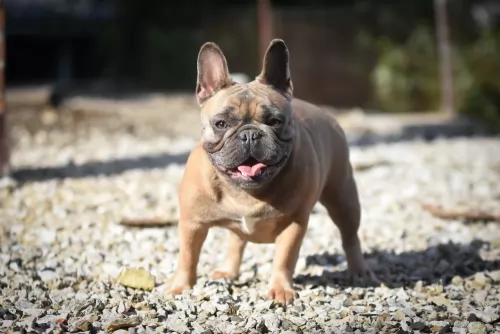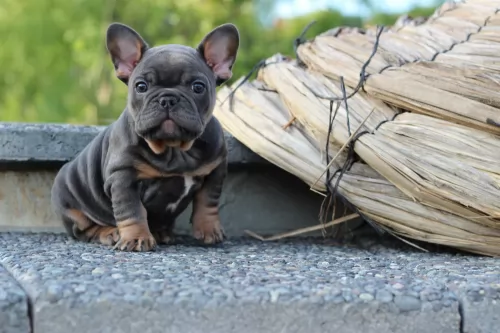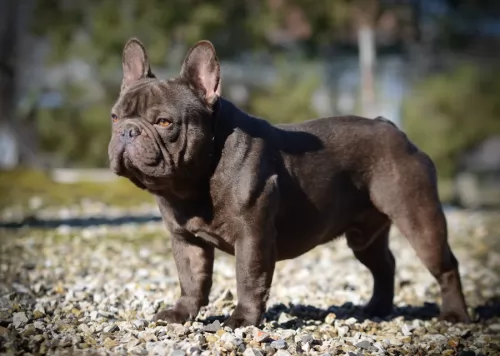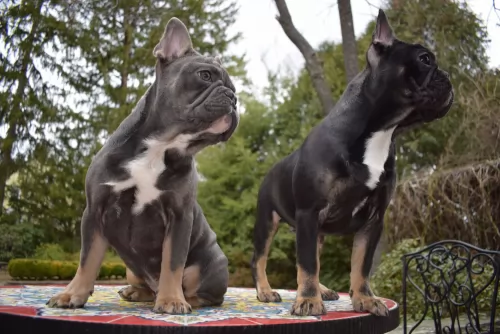 Petzlover
Petzlover French Bulldog is originated from France but Bandog is originated from United Kingdom. French Bulldog may grow 41 cm / 16 inches shorter than Bandog. French Bulldog may weigh 43 kg / 94 pounds lesser than Bandog. Both French Bulldog and Bandog has same life span. Both French Bulldog and Bandog has same litter size. French Bulldog requires Low Maintenance. But Bandog requires Moderate Maintenance
French Bulldog is originated from France but Bandog is originated from United Kingdom. French Bulldog may grow 41 cm / 16 inches shorter than Bandog. French Bulldog may weigh 43 kg / 94 pounds lesser than Bandog. Both French Bulldog and Bandog has same life span. Both French Bulldog and Bandog has same litter size. French Bulldog requires Low Maintenance. But Bandog requires Moderate Maintenance
 The french bulldog originated in England and are bred expecting small size bulldogs. Many lace workers in Nottingham had little bulldogs and when they emigrated to france, they brought their dogs with them. Soon they become popular in France and Europe. Then Americans showed interest in them.In 1896 frenchie was shown in United states in a show and after that they got their nickname "Frechie".
The french bulldog originated in England and are bred expecting small size bulldogs. Many lace workers in Nottingham had little bulldogs and when they emigrated to france, they brought their dogs with them. Soon they become popular in France and Europe. Then Americans showed interest in them.In 1896 frenchie was shown in United states in a show and after that they got their nickname "Frechie".
 The original Bandogs were bred for guarding and protecting. It is believed that the dogs were developed from eastern shepherds, the American Pit Bull Terrier and Mastiffs and crossed with western Bullenbeissers and hounds, and it is thought that the hybrid breed came into existence way back, around 1250-1300 in Middle England.
The original Bandogs were bred for guarding and protecting. It is believed that the dogs were developed from eastern shepherds, the American Pit Bull Terrier and Mastiffs and crossed with western Bullenbeissers and hounds, and it is thought that the hybrid breed came into existence way back, around 1250-1300 in Middle England.
Although it isn’t possible to say exactly how the Bandog originated, it is certain that the dogs were bred with a functional purpose – to guard and protect. In fact in the late 1960s a veterinarian by the name of Swinford started a breeding program, even though breeders of Bandogges disagree on the breeds that went into Swinford's original breeding scheme. It is believed to have been 50% American Pit Bull Terrier and 50% molosser.
 Frenchie is a good companion dog and has a powerful muscular body. They like to play but also likes to relax for more time. They are intelligent and training them is very easy until they think it a game. They are free thinkers and are not very good in obedience. Frenchies should not be leaved alone for a long time.They love spending time with humans and generally they get along with everyone. They are excellent watchdogs and alerts when strangers come.
Frenchie is a good companion dog and has a powerful muscular body. They like to play but also likes to relax for more time. They are intelligent and training them is very easy until they think it a game. They are free thinkers and are not very good in obedience. Frenchies should not be leaved alone for a long time.They love spending time with humans and generally they get along with everyone. They are excellent watchdogs and alerts when strangers come.
French bulldog suits very well in apartments. But they should be made to walk for fifteen minutes daily to avoid over weight. They should not be kept outside on hot days. Frenchies will be very happy if you stay in home. They will follow you wherever you walk inside the house. They love people so much, such that people who own a Frenchie can not imagine life without them.
 The Bandog is a powerful, stocky, muscular dog with small, upright ears. His tail is long and tapered, but most people prefer to have the tail docked. With his broad skull, wide shoulders and powerful chest, he is also confident and intelligent. He is a rugged dog, heavily boned and muscled, and quite aggressive when provoked. This characteristic comes from the intentional breeding to combine the courage and tenacity of an American Pit Bull Terrier with the size of the Bull Mastiff and its guarding instincts.
The Bandog is a powerful, stocky, muscular dog with small, upright ears. His tail is long and tapered, but most people prefer to have the tail docked. With his broad skull, wide shoulders and powerful chest, he is also confident and intelligent. He is a rugged dog, heavily boned and muscled, and quite aggressive when provoked. This characteristic comes from the intentional breeding to combine the courage and tenacity of an American Pit Bull Terrier with the size of the Bull Mastiff and its guarding instincts.
Even though the breed has a history of competitive fighting, today when he is trained and socialized he can be a devoted, controlled and amicable family pet, even getting on well with children and being social and affectionate with his human family members. They can be aggressive with strangers, more so if provoked or threatened by them.
Bandogges are able to get along with other animals in the home if they are raised with them, but can be aggressive with pets they aren’t familiar with. You won’t find a better guard dog and with his low barking tendencies, he quietly watches, waiting to go for any intruders.
 They are good children friendly dogs as they like to play with them. It will be good if they are supervised by an adult.
They are good children friendly dogs as they like to play with them. It will be good if they are supervised by an adult.
They are polite with everyone including other pets. They love to play games and chase balls but don't need much exercise.
Frenchies adapts well for apartment living but they don't like being alone for long time. They will not tolerate both hot and cold weather and so air conditioning will be better.
French Bulldogs are easy to train and are very much interested in playing.
 This is certainly an intimidating looking breed, having been developed from a variety of stock breeds, Because of this, there isn’t a standard set for the dog and his appearance can vary. He isn’t recommended for first-time dog owners, because he is quite complex – being both docile and aggressive – not your regular dog. He will certainly require an owner who shows them who is boss.
This is certainly an intimidating looking breed, having been developed from a variety of stock breeds, Because of this, there isn’t a standard set for the dog and his appearance can vary. He isn’t recommended for first-time dog owners, because he is quite complex – being both docile and aggressive – not your regular dog. He will certainly require an owner who shows them who is boss.
The Bandog may well have a reputation of being a fighter, but once he has had training and socialization, he turns out to be just a gentle giant. With a strong, firm owner, he is good with children too and becomes a devoted guardian to the entire family.
 Frenchies can suffer from Von Willebrand's disease(VWD)and thyroid condition. Due to their flat faces they suffer from elongated soft palate or cleft palate. Because of their compacted air way they have inability to effectively regulate temperature.
Frenchies can suffer from Von Willebrand's disease(VWD)and thyroid condition. Due to their flat faces they suffer from elongated soft palate or cleft palate. Because of their compacted air way they have inability to effectively regulate temperature.
Any indication that the hair is unhealthy, such as brittleness and hair loss, should be addressed immediately to avoid any further damage. Hair loss becomes a problem when it becomes excessive, possibly due to disease or a particular condition.
 Your Bandog is generally a robust, healthy breed, but he may well be prone to health concerns. Some of these are hip and elbow dysplasia and Bloat
Your Bandog is generally a robust, healthy breed, but he may well be prone to health concerns. Some of these are hip and elbow dysplasia and Bloat
This is an abnormal formation of the hip socket that can, if left unattended, lead to lameness and painful arthritis of the joints. eye problems.
His size and his deep chest also mean he is prone to bloat. Known as gastric dilatation and volvulus, this isn’t good for your dog as the stomach becomes distended with gas, putting pressure on the diaphragm, which can cause breathing problems.
Just because your Bandog is a healthy breed, it doesn’t mean your puppy is immune from his puppy shots. Your puppy will need his first vaccinations from 6 to 8 weeks of age for parvovirus, distemper, rabies and hepatitis.
Check your country’s vaccination regulations, because in the United States, most states require that all dogs be vaccinated against rabies.
 As with all dogs, proper nutrition makes your French Bulldog a happy, healthy pup. He should have his own food and water bowls. Don't feed your French bulldog puppy, uncooked meat or food that may have gone bad. Young puppies need relatively large amount of food in order to meat the demands of their rapidly growing bodies and their hectic lifestyle. Feed your puppy specially designed chewing treats from reputable pet stores.
As with all dogs, proper nutrition makes your French Bulldog a happy, healthy pup. He should have his own food and water bowls. Don't feed your French bulldog puppy, uncooked meat or food that may have gone bad. Young puppies need relatively large amount of food in order to meat the demands of their rapidly growing bodies and their hectic lifestyle. Feed your puppy specially designed chewing treats from reputable pet stores.
According to the French BullDog Club of America, there are no specific guidelines for feeding them. Options for feeding your French Bulldog are commercial dry food, canned food, raw food and homemade meals. Calories required for frenchie varies depending on size, age, activity level and metabolism.
Frenchies can be made to walk or run for a particular distances. Heavy exercises should not be given as they face respiratory problems. Avoid exercising them in hot weather as they have chances of getting heatstroke.
 These large, short-haired dogs have a short coat and they are easy to groom. Remove loose hair with a rubber brush twice a week. The breed is an average shedder and if you start regular brushing from when he is a young dog, he will be happy to let you do it as an adult. Check his ears and eyes regularly and clip his toe nails.
These large, short-haired dogs have a short coat and they are easy to groom. Remove loose hair with a rubber brush twice a week. The breed is an average shedder and if you start regular brushing from when he is a young dog, he will be happy to let you do it as an adult. Check his ears and eyes regularly and clip his toe nails.
The Bandog is an energetic breed that will require a good deal of exercise. This is one breed you can’t leave alone in your garden day after day. He will require games and walks to avoid boredom and frustration.
The Bandog puppy will grow and develop quickly, so his diet should be good quality dog food. He is big and thirsty and there must be a ready source of clean drinking water. Because he is inclined to drool, his water bowl will need to be cleaned out regularly to avoid him drinking contaminated water.